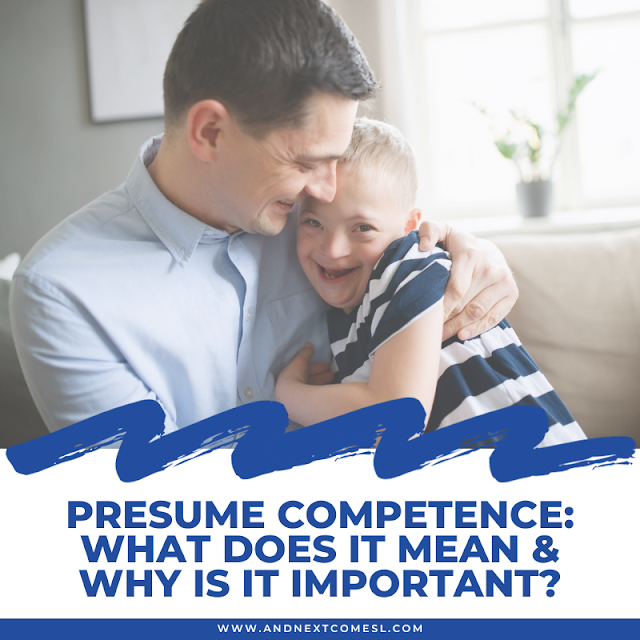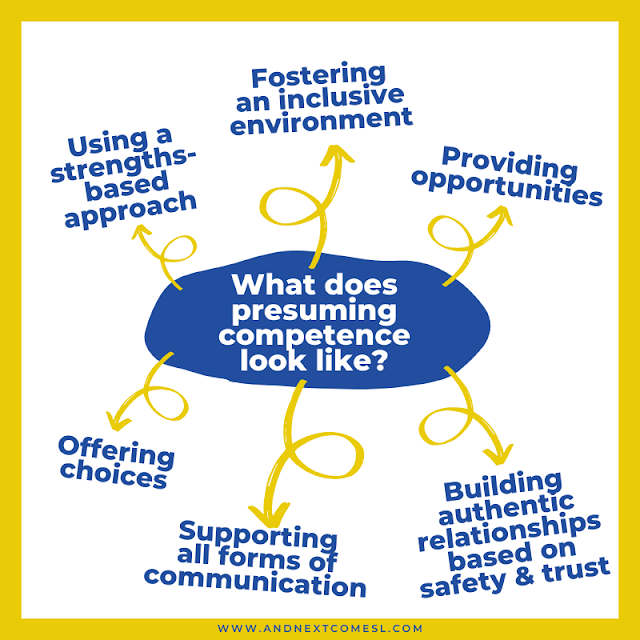There are a lot of different terms and phrases that you might come across when learning about topics like autism, hyperlexia, neurodiversity, gestalt language processing, disability, and so on. There's also a lot of acronyms to navigate. It feels like learning a whole new language some days!
Then there are also some terms that you might encounter as your child starts therapy. Or there are the terms that get tossed around during meetings with the special education team.
One specific term or concept that you might come across frequently - especially as it relates to augmentative and alternative communication (AAC) - is the term presumed competence. It's quite an important concept and term to discuss, I might add. It's also a term that you might see popping up more and more on social media lately.
But what exactly does it mean to presume competence? And why is it important? Well, that's what we're going to discuss below.
Presume Competence Definition
First, let's break the phrase down into its two words:
- Presume = assume, believe, expect
- Competence = ability, capacity, proficiency
In other words, presuming competence is the belief that an individual is capable of thinking, learning, and understanding, even if there's no tangible evidence, they aren't able to show it yet, or regardless of what standardized test scores show.
Basically, presuming competence is about:
- Giving people the benefit of the doubt
- Offering support and providing opportunities for individuals to show their skills and their potential
- Not making assumptions based on their challenges, weaknesses, disabilities, and/or diagnostic label
- Treating people with respect
- Valuing everyone's unique strengths, abilities, and contributions
Why is Presuming Competence Important?
Now that you have a better idea of what it means to presume competence, let's look at the benefits of doing so. Here's why it's important to always presume competence:
- It's the "least dangerous assumption" (source) as presuming incompetence, for instance, would be much more harmful
- Reduces stigmas and rejects stereotypes that are associated with disabilities
- Supports inclusion
- Improves communication
- Strengthens relationships
- Values and respects individuals for who they are, as well as their unique strengths and contributions
- Gives people a chance and provides opportunities instead of making assumptions about what they can and cannot do
- Prevents underestimation because you are setting appropriate and high expectations (vs. setting low expectations based on stereotypes or a diagnostic label)
- Recognizes that traditional or standardized assessments may be flawed and don't always give an accurate representation of what one can do
- Strengthens self-esteem and fosters independence
- It's empowering
Obviously, this list is not exhaustive. Yet, you can see how powerful presuming competence can be. Especially with minimally speaking or non-speaking individuals who, too often, aren't always seen as capable.
But what does presumed competence look like in practice?
What Does Presuming Competence Look Like?
To avoid overwhelming you with too much information, I'm only including a small list of examples below. I will have another post that is much more detailed. But here is a simple list of what it looks like to presume competence. It means:
- Supporting all forms of communication (including AAC)
- Using a strengths-based approach
- Tailoring supports and accommodations to the individual vs. tailoring them to the disability or diagnostic label
- Seeing individuals as capable of learning
- Providing opportunities
- Offering choices
- Fostering an inclusive environment
- Celebrating diversity
- Not making assumptions
- Rejecting stereotypes and reserving judgment
- Building authentic relationships based on safety and trust
- Recognizing that sometimes there's a difference between what someone understands and what they are able to show and finding ways to support individuals in showing their understanding
- Setting expectations that reflects the individual's potential vs. setting low expectations based on assumptions or stereotypes
- Recognizing that behavior is communication and has a purpose
You might already be doing some of these things naturally, especially if you are taking a neurodiversity-affirming approach to your parenting, teaching, or therapy. And that's great! But unfortunately, presuming competence still isn't standard practice for some professionals or in certain fields.
If you'd like to learn more about how to presume competence, read these tips and strategies for presuming competence.
A Quick Recap of Presuming Competence
Just to recap all that was discussed above, here are some key takeaways:
- Presuming competence is about believing that all individuals are capable of thinking, learning, and understanding
- Presuming competence is important because assuming otherwise is much more harmful. In other words, presuming competence is the "least dangerous assumption."
- There are lots of ways to show that you are presuming competence, including: supporting all forms of communication, taking a strengths-based approach, providing opportunities, rejecting stereotypes, not making assumptions, being respectful and inclusive, and giving people the benefit of a doubt.
Thanks for taking the time to learn more about what it means to presume competence. Hopefully you found this information helpful.







